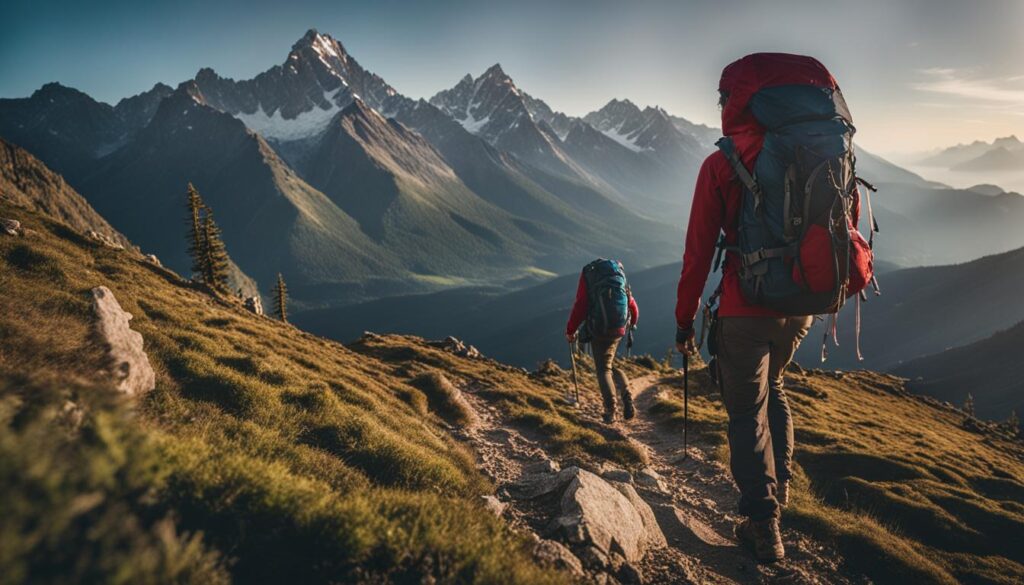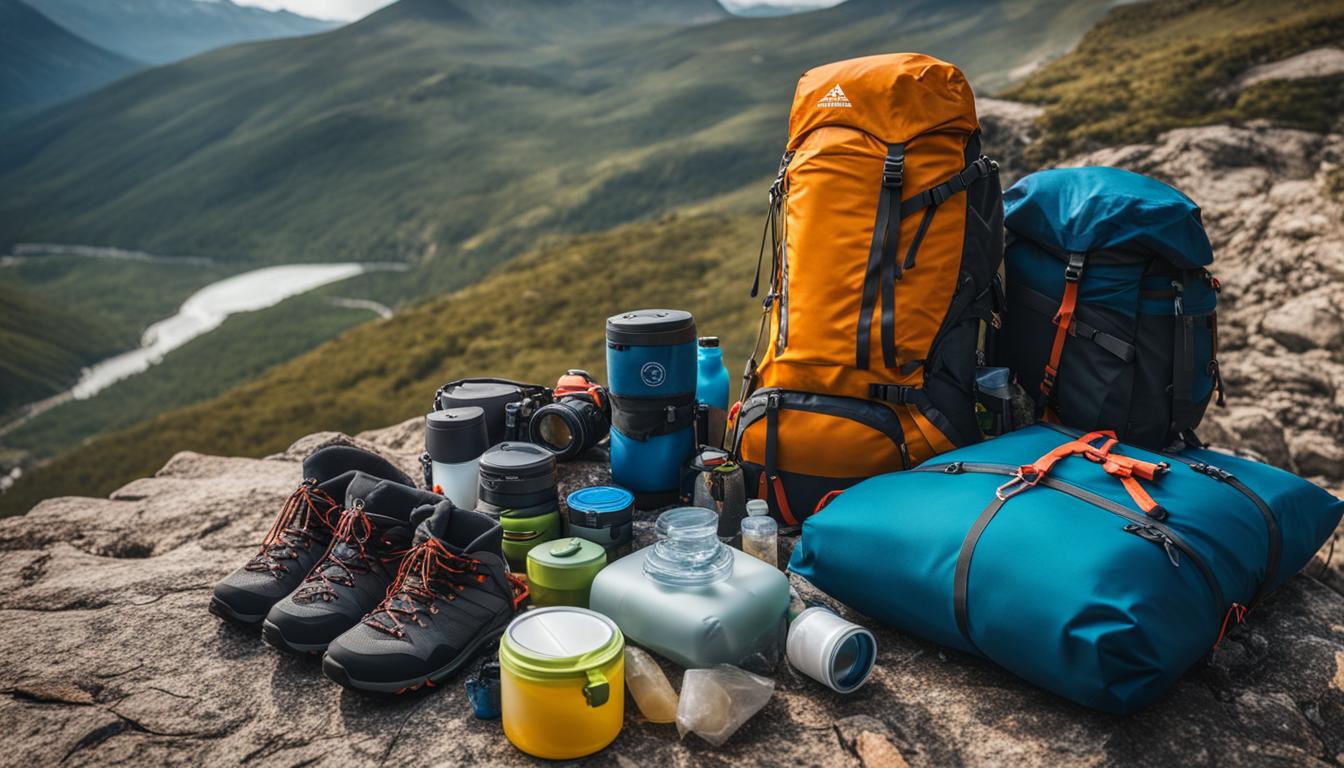Embarking on a first-time backpacking trip can be both exciting and intimidating. Many beginners have concerns about safety, packing the right gear, planning their route, and overcoming their fears of wildlife and strangers. However, with proper preparation and knowledge, these challenges can be overcome to have a successful outdoor adventure.
- Research and familiarize yourself with the common animals in the area to overcome the fear of wildlife.
- Take precautions such as carrying bear spray and hiking with a group to ensure backpacking safety in wildlife-rich environments.
- Joining hiking groups or finding hiking buddies with experience can provide guidance and support for a safer and more enjoyable trip.
- Proper planning, including researching trail conditions and having the necessary gear, is crucial for a successful backpacking experience.
- Physical preparation through day hikes and practicing with gear will build confidence and endurance.
Overcoming Fear of Wildlife and Strangers

When venturing into the wilderness for a backpacking trip, it is natural to feel apprehensive about encountering wildlife and strangers. However, with some essential knowledge and precautions, you can overcome these fears and enjoy a safe and fulfilling experience.
One of the first steps is to research the common animals that inhabit the area you are visiting. Knowing what to expect can help you prepare mentally and take appropriate precautions. For example, if you are backpacking in bear country, it is crucial to understand bear safety measures. Carry bear spray, make noise to avoid surprising them, and store food properly to minimize the risk of attracting bears to your campsite. Similarly, if you are hiking in an area known for venomous snakes, learn how to identify them and what to do in case of an encounter.
When it comes to encountering strangers, it’s important to trust your instincts and use common sense. While most fellow backpackers are friendly and helpful, it’s essential to be cautious and avoid potentially risky situations. Stick to well-established trails, hike during daylight hours, and camp in designated areas whenever possible. If you come across individuals who make you feel uncomfortable, it’s best to maintain a safe distance and, if necessary, change your route to avoid them.
Wildlife and Stranger Safety Tips:
- Research the common animals in the area and take precautions accordingly.
- Learn about bear safety measures and carry bear spray.
- Make noise to alert wildlife of your presence.
- Store food properly to avoid attracting animals to your campsite.
- Be cautious when encountering strangers and trust your instincts.
- Stick to well-established trails and avoid isolated areas.
- Hike during daylight hours and camp in designated areas.
By arming yourself with knowledge and following these safety guidelines, you can overcome your fear of wildlife and strangers and fully immerse yourself in the beauty of the wilderness. Remember, backpacking is a rewarding adventure that allows you to connect with nature and discover your own inner strength.
Solo Backpacking vs. Backpacking with a Group

When planning a first-time backpacking trip, one crucial decision to make is whether to go alone or join a group. Both options have their advantages and considerations, so it’s essential to weigh the pros and cons before embarking on your adventure.
Solo Backpacking
Embarking on a solo backpacking trip can be an empowering and transformative experience. It allows you to fully immerse yourself in nature, test your self-reliance, and push your limits. Solo backpacking offers the freedom to set your own pace, choose your route, and make spontaneous decisions along the way. It can be a journey of self-discovery and personal growth.
However, solo backpacking also comes with additional responsibilities and risks. Without the support of a group, you must be self-sufficient and confident in your outdoor skills. Navigation, first aid, and emergency preparedness become even more crucial. It’s essential to thoroughly research your destination, inform someone of your itinerary, and carry appropriate safety gear. Additionally, being alone in the wilderness can bring feelings of solitude and vulnerability, so it’s important to be mentally prepared for the challenges that may arise.
Backpacking with a Group
Backpacking with a group can make the outdoor experience more enjoyable and safer, especially for first-time backpackers. Traveling with others allows for shared responsibilities, resources, and knowledge. It provides a sense of camaraderie and support, alleviating some of the stress and uncertainties that come with being alone in the wilderness.
Going with a group also enhances safety. In case of an emergency, there are more people available to assist and seek help if needed. Furthermore, experienced backpackers can provide guidance and share their knowledge, teaching you valuable skills along the way. Backpacking with a group can also be a great opportunity to make new friends, strengthen relationships, and create lasting memories together.
| Advantages of Solo Backpacking | Advantages of Backpacking with a Group |
|---|---|
|
|
| Considerations for Solo Backpacking | Considerations for Backpacking with a Group |
|
|
Ultimately, the choice between solo backpacking and backpacking with a group depends on your personal preferences, goals, and comfort levels. Whether you seek solitude and self-reflection or value the companionship and shared experiences, both options can lead to unforgettable adventures. Whichever path you choose, proper planning, preparation, and a positive mindset will allow you to overcome challenges and make the most of your first-time backpacking trip.
What are some common challenges that first-time backpackers may encounter and how can they be overcome?
First-time backpackers often face challenges such as overpacking, improper gear, and navigation issues. To overcome these, it’s crucial to research and prioritize essential items, invest in quality gear, and practice map reading and using a compass. These tips for backpacking adventure can make the journey smoother and more enjoyable.
Tips for Planning and Preparation
When it comes to first-time backpacking, proper planning and preparation are essential for a successful and enjoyable trip. Here are some tips to help you get started:
Backpacking Trip Planning
Before heading out on your adventure, take the time to plan your trip thoroughly. Research the trail you’ll be hiking, including its difficulty level, terrain, and any potential hazards. Identify the best time of year to visit and check for any necessary permits or reservations. Creating a detailed itinerary with estimated hiking times and campsites will help ensure a smooth journey.
Backpacking Gear Checklist
Having the right gear is crucial for a safe and comfortable backpacking experience. Make a checklist of all the essential items, such as a sturdy backpack, a tent, a sleeping bag, cooking equipment, and appropriate clothing for the weather conditions. Don’t forget navigation tools like a map, compass, or GPS device. Properly packing and organizing your gear will save you time and frustration on the trail.
Physical Preparation
Preparing physically for your backpacking trip is just as important as planning and gear selection. Start by gradually increasing your fitness level through regular exercise and hikes. Focus on building endurance and strength to handle long days of hiking with a heavy pack. Additionally, practice using your gear, setting up your tent, and filtering water to familiarize yourself with their functionality.
Navigation Skills
Developing navigation skills is crucial for staying on course during your backpacking trip. Learn how to read a map and use a compass or GPS device effectively. Familiarize yourself with trail markers and signs. Practice your navigation skills on shorter hikes before attempting more challenging trails. Being confident in your ability to navigate will give you peace of mind while exploring the wilderness.
By following these tips and investing time in planning, gear selection, physical preparation, and navigation skills, you’ll be well-equipped to overcome the challenges of first-time backpacking. Remember, a successful backpacking trip is not only about the destination but also the journey itself.

